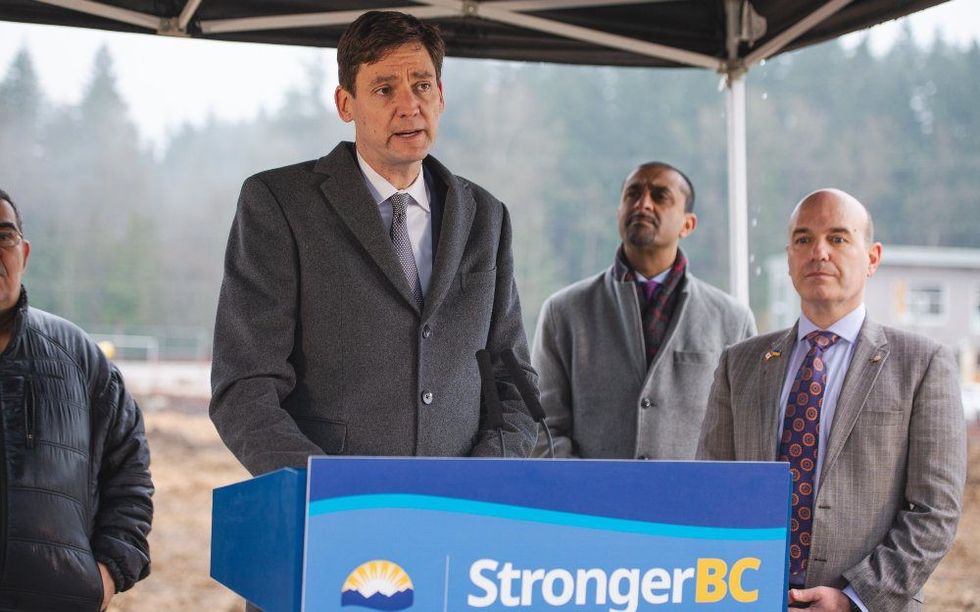Premier David Eby and the BC NDP are on solid ground with British Columbians, with a survey conducted by Leger showing a sizeable gap between Eby and the other three party leaders, as well as between the NDP and the other three parties.
According to the survey results published on Monday, Eby holds a 49% approval rating. BC Liberals Leader Kevin Falcon was second at 31%, followed by Sonia Furstenau of the Greens at 30%, and Conservatives Leader Trevor Bolin at 18%. (A survey conducted by Research Co. last week resulted in the same order and similar lead for Eby.)
A total of 1,003 British Columbians aged 18 or older took part in the survey in January, and Leger notes that 23% of respondents abstained from providing a rating, either way, on Eby, compared to only 10% for John Horgan in 2021 -- a sign that Eby may still have work to do.
As was the case heading into the municipal elections in October, housing and affordability remains the top issue, identified as such by 22% of respondents. Rising interest rates and inflation were identified by 19% of respondents, followed by 18% for healthcare.
Broken down by age cohort, the importance of housing is even starker, with 37% of those between the ages of 18 and 34 identifying it as a top issue. The top issue among those between the ages of 35 and 54 was rising interest rates and inflation, while the top issue among those over 55 was health care.
Broken down by provincial region, the same three issues held steady throughout Metro Vancouver, Vancouver Island, and the rest of BC, with no significant difference across the three regions on each of the three issues, with the exception of rising interest rates and inflation. While 22% of those in Metro Vancouver identified it as a top issue, only 14% of those on Vancouver Island agreed.
What do British Columbians think about how the current government is addressing these top issues?
Of the 17 key issues included in the survey, housing prices and affordability -- identified by the most respondents as the top issue -- had the highest disapproval rating, at 58%. That was closely followed by homelessness (57%), poverty (51%), the illicit drug and overdose crisis (49%), and health care (48%). (Rising interest rates and inflation were not included in this section.)
The weekend after Eby was sworn in, he announced the Housing Supply Act, which will give the Province the authority to set and monitor housing targets for municipalities; as well as changes to the Strata Property Act, which ended all bans on rentals in strata condominiums.

Eby has also made the Ministry of Housing a dedicated standalone ministry, naming Ravi Kahlon as the Minister of Housing, who subsequently increased funding for the Residential Tenancy Branch, which handles renter-landlord disputes and has been overwhelmed since the COVID-19 pandemic.
In January, Eby and Kahlon announced the $500M Rental Protection Fund, which will allow non-profits to acquire old rental buildings, shielding them from being acquired by speculators and preserving some existing rental stock. They also announced a new Permitting Strategy for Housing, creating a "one-stop shop" with the hopes of removing bureaucratic barriers and speeding up provincial permitting timelines.
What most of these actions have in common is that they are only announcements right now, and most of them have not been actualized, so despite generally-positive sentiments about these various housing-related actions, British Columbians have yet to see them in action, let alone bear fruit.
The strata rental changes are already in effect, but the Housing Supply Act is still going through the legislative process. The Ministry of Housing is up and running, but the Residential Tenancy Branch is likely still in the process of using the funding to hire new staff, not to mention dealing with the case backlog.
READ: BC Gov Creates $500M Fund For Non-Profits To Acquire Rental Buildings
It also remains unclear when the permitting "one-stop shop" will be up and running. However, the timeline for the Rental Protection Fund is a bit clearer, with Jill Atkey, CEO of the BC Non-Profit Housing Association, telling STOREYS that the concept for the Rental Protection Fund is in place and the fine details expected to be worked out by late-March.
It's about delivering results, as Eby himself has repeatedly emphasized, so while Eby and the NDP are currently in decent standing, there is still much to be done on the housing front. In other words, the honeymoon period may be coming to an end soon, and British Columbians will undoubtedly be watching.





















